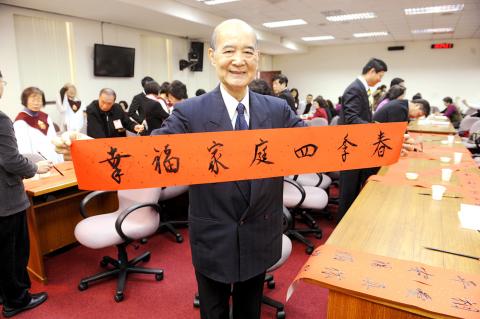Iconic democracy pioneer and Christian minister the Reverend Kao Chun-ming (高俊明), 89, passed away yesterday at 5:25pm, the Presbyterian Church in Taiwan said.
Kao, a life-long Taiwan independence advocate, was known for helping Shih Ming-te (施明德) give the authorities the slip, after Shih became a fugitive because of his involvement in the 1979 Kaohsiung Incident during the White Terror era.
Arrested in April 1980, Kao was sentenced to seven years in prison, but later served as an adviser to former president Chen Shui-bian (陳水扁).

Photo: George Tsorng, Taipei Times
Presidential Office spokesperson Xavier Chang (張惇涵) said in a statement yesterday President Tsai Ing-wen (蔡英文) mourned Kao’s death and that the nation had lost a great man.
“Kao was a guiding light for Taiwanese democracy and his courage will be remembered forever, as the bush that burned and was not consumed,” Chang said.
Kao was born in 1929. His grandfather Kao Chang (高長) was the nation’s first Presbyterian convert and a follower of medical doctor and missionary James L. Maxwell Sr.
In an interview with the Chinese Christian Tribune, Kao Chun-ming said he was a willful child who hated going to church and studying.
He came to appreciate his circumstances and the importance of intellectual pursuits only after attending night school in Japan, where students from less fortunate backgrounds worked to earn a living by day and studied by night, Kao Chun-ming said.
Witnessing the carnage after the allied forces bombed Japan in World War II, he experienced a spiritual awakening and decided to attend a seminary, Kao Chun-ming said.
Kao Chun-ming served as the principle of Yushan Theological College and Seminiary from 1957 to 1970.
In 2012, then-Tainan mayor William Lai (賴清德) visited him at his residence and presented him with a commendation that honored him as a “Taiwanese of high character.”
Last month, Kao Chun-ming cosigned a public letter asking Tsai not to seek re-election next year, citing the electoral drubbing that the Democratic Progressive Party received in November last year.

An essay competition jointly organized by a local writing society and a publisher affiliated with the Chinese Communist Party (CCP) might have contravened the Act Governing Relations Between the People of the Taiwan Area and the Mainland Area (臺灣地區與大陸地區人民關係條例), the Mainland Affairs Council (MAC) said on Thursday. “In this case, the partner organization is clearly an agency under the CCP’s Fujian Provincial Committee,” MAC Deputy Minister and spokesperson Liang Wen-chieh (梁文傑) said at a news briefing in Taipei. “It also involves bringing Taiwanese students to China with all-expenses-paid arrangements to attend award ceremonies and camps,” Liang said. Those two “characteristics” are typically sufficient

A magnitude 5.9 earthquake that struck about 33km off the coast of Hualien City was the "main shock" in a series of quakes in the area, with aftershocks expected over the next three days, the Central Weather Administration (CWA) said yesterday. Prior to the magnitude 5.9 quake shaking most of Taiwan at 6:53pm yesterday, six other earthquakes stronger than a magnitude of 4, starting with a magnitude 5.5 quake at 6:09pm, occurred in the area. CWA Seismological Center Director Wu Chien-fu (吳健富) confirmed that the quakes were all part of the same series and that the magnitude 5.5 temblor was

The brilliant blue waters, thick foliage and bucolic atmosphere on this seemingly idyllic archipelago deep in the Pacific Ocean belie the key role it now plays in a titanic geopolitical struggle. Palau is again on the front line as China, and the US and its allies prepare their forces in an intensifying contest for control over the Asia-Pacific region. The democratic nation of just 17,000 people hosts US-controlled airstrips and soon-to-be-completed radar installations that the US military describes as “critical” to monitoring vast swathes of water and airspace. It is also a key piece of the second island chain, a string of

The Central Weather Administration has issued a heat alert for southeastern Taiwan, warning of temperatures as high as 36°C today, while alerting some coastal areas of strong winds later in the day. Kaohsiung’s Neimen District (內門) and Pingtung County’s Neipu Township (內埔) are under an orange heat alert, which warns of temperatures as high as 36°C for three consecutive days, the CWA said, citing southwest winds. The heat would also extend to Tainan’s Nansi (楠西) and Yujing (玉井) districts, as well as Pingtung’s Gaoshu (高樹), Yanpu (鹽埔) and Majia (瑪家) townships, it said, forecasting highs of up to 36°C in those areas